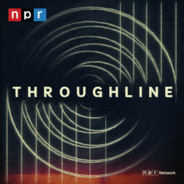
Kultur & Gesellschaft
Throughline Folgen
Throughline is a time machine. Each episode, we travel beyond the headlines to answer the question, "How did we get here?" We use sound and stories to bring history to life and put you into the middle of it. From ancient civilizations to forgotten figures, we take you directly to the moments that shaped our world. Throughline is hosted by Peabody Award-winning journalists Rund Abdelfatah and Ramtin Arablouei.Subscribe to Throughline+. You'll be supporting the history-reframing, perspective-shifting, time-warping stories you can't get enough of - and you'll unlock access bonus episodes and sponsor-free listening. Learn more at plus.npr.org/throughline
Folgen von Throughline
-
Folge vom 13.10.2022The Dance of the Dead (2021)Halloween — the night of ghost stories and trick-or-treating — has religious origins that span over two thousand years. Over time, the Catholic Church, pagan groups, and even the brewing company Coors have played a role in shape-shifting the holiday. How did Halloween turn from a spiritual celebration to a multi-billion dollar industry? From the Great Famine of Ireland to the Simpsons, we present the many evolutions of Halloween.Learn more about sponsor message choices: podcastchoices.com/adchoicesNPR Privacy Policy
-
Folge vom 06.10.2022Silicon IslandIn a world where computer chips run everything from laptops to cars to the Nintendo Switch, Taiwan is the undisputed leader. It's one of the most powerful tech centers in the world — so powerful that both China and the U.S. have vital interests there. But if you went back to the Taiwan of the 1950s, this would have seemed unimaginable. It was a quiet, sleepy island; an agrarian culture. Fifty years later, it experienced what many recall as an "economic miracle" — a transformation into not just one of Asia's economic powerhouses, but one of the world's.This transformation was deliberate: the result of an active policy by the Taiwanese government to lure its people back from Silicon Valley. In the 1970s and 80s the government of Taiwan, led by finance minister K.T. Li, the "father of Taiwan's Miracle," actively recruited restless and ambitious Taiwanese businessmen, many of whom felt like they'd hit a glass ceiling in the U.S., to return to Taiwan and start technology companies. Today, those companies are worth billions.In this special collaboration between Throughline and Planet Money, we talk to one such billionaire: Miin Wu, founder of Macronix, a computer chip company. When he left the U.S., he brought back dozens of Taiwanese engineers with him — one article called it a "reverse brain drain." This episode tells the story of his journey from California's Silicon Valley to Asia's Silicon Island, and the seismic global shift it kicked off.Learn more about sponsor message choices: podcastchoices.com/adchoicesNPR Privacy Policy
-
Folge vom 29.09.2022Editing RealityWe live in divided times, when the answer to the question 'what is reality?' depends on who you ask. Almost all the information we take in is to some extent edited and curated, and the line between entertainment and reality has become increasingly blurred. Nowhere is that more obvious than the world of reality television. The genre feeds off our most potent feelings – love, hope, anxiety, loneliness – and turns them into profit... and presidents. So in this episode, we're going to filter three themes of our modern world through the lens of reality TV: dating, the American dream, and the rage machine.Learn more about sponsor message choices: podcastchoices.com/adchoicesNPR Privacy Policy
-
Folge vom 22.09.2022Five Fingers Crush the Land (2021)Over one million Uyghur people have been detained in camps in China, according to estimates, subjected to torture, forced labor, religious restrictions, and even forced sterilization. Last month, the United Nations released a report saying that China's treatment of Uyghurs could be considered "crimes against humanity." The vast majority of this minority ethnic group is Muslim, living for centuries at a crossroads of culture and empire along what was once the Silk Road. This week, we explore who the Uyghur people are, their land, their customs, their music and why they've become the target of what many are calling a genocide.Learn more about sponsor message choices: podcastchoices.com/adchoicesNPR Privacy Policy
